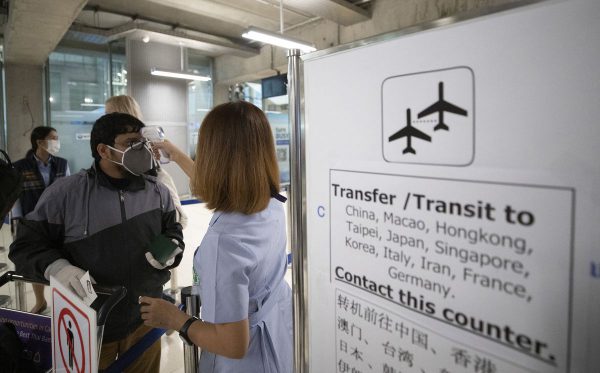BANGKOK, 10 March 2020: Nations worldwide are tightening entry restrictions including outright travel bans to cut visits from high-risk countries in the hope it will slow the spread of the Covid-19 virus.
The latest updates on Thailand’s announcement on screening and quarantine are posted at the end of this report.
Singapore was one of the first to impose new travel restrictions when it announced a move to strengthen defences against COVID-19 last week. All new visitors who have visited mainland China, Iran, northern Italy or the Republic of Korea, within the last 14 days, will not be allowed to enter Singapore or transit through Changi Airport.
Indonesia’s Department of Foreign Affairs has temporarily barred entry to citizens of Iran, Italy, and South Korea. However, if travellers from the three countries have health certificates that show they are free of the Covid-19 virus, they can board airlines and travel to Indonesia, where they will undergo more health checks.

Hong Kong’s Department of Health announced that all travellers, regardless of travel history, will be required to submit a health declaration form upon arrival at Hong Kong International Airport.
South Korea announced the cancellation of its visa-waiver programme for Japanese nationals effective 9 March. Visas and permits already issued will be invalidated.
Brunei has imposed a travel ban on travellers from Iran and Italy or other nationalities who have visited the two countries within the last 14 days.
Qatar has temporarily barred travellers from 14 nations effective 9 March. The ban covers travellers from China, Egypt, India, Iran, Iraq, Lebanon, Bangladesh, Nepal, Pakistan, Philippines, South Korea, Sri Lanka, Syria and Thailand.
The Czech Republic says all travellers arriving from Italy must enter a 14-day quarantine.
India tightened travel restrictions, 5 March, banning foreign travellers who have visited Iran and Japan since 1 February from entering the country.
Meanwhile, travellers arriving from Italy and South Korea must produce medical certificates confirming that they are free from the virus in order to enter the country.
The Bahamas has expanded an entry ban to include foreign travellers who visited or transited through Iran, Italy or South Korea in the last 20 days.
The Maldives has suspended flights between Malé and Italy until further notice.
Also, Kuredu Island Resort & Spa in Lhaviyani atoll has been in lockdown since 6 March after a tourist at the hotel tested positive for novel coronavirus (COVID-19) when they returned to Italy, and Thinadhoo island in Vaavu atoll was placed in lockdown after an Italian tourist showed symptoms of the infection.
Nepal suspends its visa-on-arrival privilege for nationals from China, South Korea, Iran, Italy, and Japan, effective 10 March. Affected nationals who apply for a visa before entering the country, as well as transit passengers from the above countries, will need to provide a medical certificate confirming they are free from infection.
Russia announced 5 March that all travellers arriving in Moscow from France, Germany, Iran, Italy, Norway, South Korea, Spain, Switzerland, the UK and the US would be subject to a mandatory 14-day quarantine period at a hospital in Kommunarka, Moscow.
Thailand
The Civil Aviation Authority of Thailand announcement 9 March
Following the government’s decision to define South Korea, China, (including Macau and Hong Kong), Italy and Iran as Disease Infected Zones of the Covid-19 outbreak, the CAAT has ordered airlines flying from the above countries to adopt the following procedures.
Airlines must conduct a health screen for passengers at the time of check-in. The passengers need to present health certificates certifying that they are not at risk of contracting the Covid-19 virus. If the passenger is unable to present such certificate, boarding shall be denied and the boarding pass shall not be issued.
Tourism Authority of Thailand situation update, 7 March
“Extra entry screening of travellers from the “disease infected zones” (China,(Hong Kong and Macau included) South Korea, Iran and Italy is now in place at Suvarnabhumi Airport in Bangkok.
“Aircraft flying from the listed countries are assigned parking bays adjacent to Concourses C, E, F and G for separate entry screening upon arrival. “Travellers with a body temperature of 37.5 degrees Celsius or higher and demonstrate respiratory symptoms (cough, runny nose, sore throat or shortness of breath) with a history of travel to the Covid-19 epidemic areas will be isolated and transferred to a designated hospital for quarantine or treatment.”
Department of Disease Control’s instructions for visitors to Thailand introduced 7 March.
“Travellers who departed from China (including Macau and Hong Kong), Republic of Korean, Italy, and Iran are required to undergo self-quarantine at designated areas or at residences. For travellers from areas with ongoing local transmissions (Japan, Singapore, Taiwan, Germany, France, etc) are recommended to implement self-monitoring at residences and check their body temperature for 14 days.
“It is also recommended to avoid visiting public or crowded places. Do not share personal stuff with others and keep at least one metre away when making contact with others.
If symptoms become evident including coughing, sneezing, sore throat, shortness of breath and runny nose, wear a mask and seek medical care at the nearest hospital immediately and inform the doctor about your travel history.”







